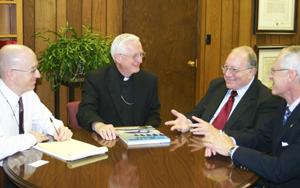
By Barb Arland-Fye
As organizers prepared for this week’s Synod of Bishops for the Middle East, a Chicago-based representative of Israel’s Consulate General was building relations with Bishop Martin Amos and St. Ambrose University in Davenport.
Robert Schwartz, a senior policy advisor for Israel’s Consulate General, met for breakfast Oct. 8 with some St. Ambrose faculty members to discuss a proposed study abroad at Hebrew University in Jerusalem for students in St. Ambrose’s Master of Business Administration program.
Hebrew University is among the top research universities in the world, said Mark Brand, an associate professor in marketing at St. Ambrose who is investigating the possibility of the study abroad program for the end of 2011. He noted that Israel also is ranked second in the world, behind the United States, in start-up companies.
The study abroad would focus on leadership from the Israeli perspective, with an emphasis on entrepreneurship, Brand noted. Students also would visit religious sites that are significant to the Jewish, Catholic and Muslim faiths, all of which are represented at St. Ambrose.
In addition to collaboration on a study abroad, Schwartz hopes to work with St. Ambrose and other groups, including Iowa’s congressional delegation, in organizing an “Ag-tech” symposium to be held possibly in Davenport. He said Israel’s agricultural technical expertise is among the best in the world.
In his meeting with Bishop Amos and diocesan Social Action Director Kent Ferris, Schwartz discussed peace efforts in the Middle East and the complexity of the conflict there. Asked whether the Israelis would be willing to extend a freeze on settlement construction in the West Bank, Schwartz said that is a possibility, but he noted that “the real problem is much more complicated.”
The most important issue for the Israelis, Schwartz said, is for Palestinians and the Arab world to recognize Israel as the state for Jewish people. Another issue of concern for Israelis is incitement against Israel by the Palestinians, such as naming streets, schools and playgrounds after terrorists and indoctrinating students with anti-Israel propaganda through textbooks and media.
Schwartz said that Israel supports a two-state solution, but people need to acknowledge that a two-state solution means two states for two peoples — the Jewish people and the Palestinians.
He and Allan Ross, executive director of the Jewish Federation of the Quad Cities who accompanied Schwartz, pointed out that economic development is growing in the Palestinians’ West Bank. Israel is trying to encourage the infrastructure and entrepreneurship that can help sustain growth. “With economic development and trade between Israel and the West Bank, this cooperation can bring about being able to work together and plan together,” Ross said. “The personal contact will hopefully lead to a lessening of tensions, a lessening of terrorism, a willingness to work for peace, and a willingness to understand each other better.” The Palestinians’ Gaza Strip is a different story because it is led by the terrorist organization Hamas, Ross said, and has no part in the present U.S.-brokered Middle East peace talks.
Bishop Amos expressed an appreciation to both men for further enlightening him on the Middle East situation. “You’ve impressed on me how complex the situation is,” the bishop said.








